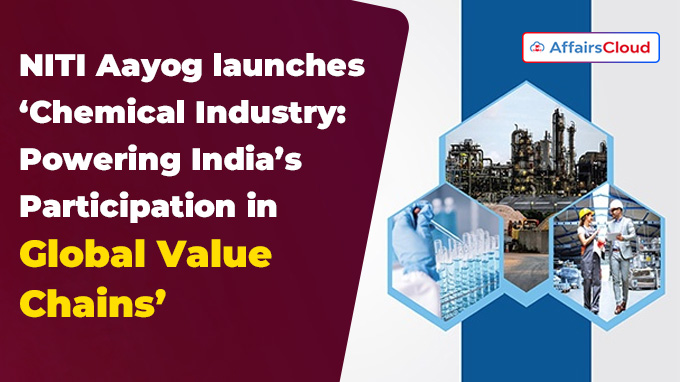 On July 3, 2025, the National Institution for Transforming India (NITI) Aayog released the report titled “Chemical Industry: Powering India’s Participation in Global Value Chains”. This report offers an extensive analysis of India’s chemical sector, highlighting both opportunities and challenges, and outlining a pathway for positioning India as a key player in global chemical markets.
On July 3, 2025, the National Institution for Transforming India (NITI) Aayog released the report titled “Chemical Industry: Powering India’s Participation in Global Value Chains”. This report offers an extensive analysis of India’s chemical sector, highlighting both opportunities and challenges, and outlining a pathway for positioning India as a key player in global chemical markets.
- The report was launched by BVR Subrahmanyam, Chief Executive Officer(CEO) of NITI Aayog and Suman Bery vice chairman of NITI Aayog.
- According to the report, India is currently the world’s sixth-largest and Asia’s third largest producer of chemicals, supplying essential raw materials to industries such as pharmaceuticals, textiles, automotive, and agriculture.
Key Highlights:
i.The share of India in global chemical value chains stood at 3.5%, with a chemical trade deficit of USD 31 billion (bn) in 2023, reflecting the country’s heavy dependence on imported feedstock and specialty chemicals.
ii.The domestic chemicals market was valued at USD 220 bn in 2023 and is expected to grow to around USD 400 to 450 bn by 2030, and to reach about USD 1 trillion (tn) by 2040 with the Government support.
- India’s chemical industry currently contributes approximately 7% to the national gross domestic product (GDP).
iii.Challenges: India’s low investment of just 0.7% in Research and Development (R&D) against the global average of 2.3%, limits indigenous innovation in high-value chemicals.
- Apart from regulatory delays, the sector is also affected by a 30% shortfall in skilled professionals, particularly in emerging areas such as green chemistry, nanotechnology, and process safety.
- The infrastructure gaps, outdated industrial clusters, and high logistics costs are the other challenges that have created a cost disadvantage compared to global peers.
Proposed interventions for growth:
i.Establish world-class chemicals hubs in India: Establishment of empowered central-level committee, along with creation of chemical fund and a hub-level administrative body to handle the overall management of the hub.
ii.Develop existing port infrastructure: Formation of a Chemical Committee at ports to advise on and address infrastructure gaps in chemical trading, along with the development of 8 high-potential chemical clusters to boost sectoral growth.
iii.Introduce a Opex subsidy scheme for chemicals: Incentivize incremental production of chemical based on import bill, export potential, single source country dependence, end-market criticality etc.
iv.Develop and access technologies to enhance self-sufficiency and foster innovation: Promoting innovation through R&D fund disbursement and stronger industry-academia ties via an interface agency with Department of chemicals and Petrochemicals (DCPC), Ministry of Chemicals and Fertilizers(MoCF) and Department of Science and Technology (DST), Ministry of Science and Technology(MoS&T).
v.Fast-track environmental clearance with transparency and accountability: Setting up of audit committee under the Department of Promotion of Industry and Internal Trade (DPIIT) to monitor timelines compliance and publish periodic reports.
vi.Securing FTAs to support Industry growth: Raising Free Trade Awareness (FTA) awareness, simplifying procedures, and easing origin proofs can help more exporters access benefits and boost competitiveness.
vii.Talent and skill upgradation in the chemical industry:
- Expansion of Industrial Training Institutes (ITIs) and specialized training institutes.
- Upgrading faculty and teacher training.
- Introducing industry relevant courses in core areas like petrochemicals, polymer science, and industrial safety.
Vision for 2030:
i.India envisions becoming a leading global hub for chemical manufacturing by 2030, targeting a 5%–6% share in the global chemical value chain.
ii.The sector aims to double its current production capacity and drastically reduce the trade deficit, from USD 31 billion in 2023, to achieve a net-zero trade balance.
iii.This transformation is expected to boost exports by an additional USD 35–40 bn and generate approximately 7 lakh skilled employment opportunities.
About National Institution for Transforming India (NITI) Aayog:
Chairman – Prime Minister (PM) of India (Currently Narendra Modi)
Chief Executive Officer(CEO) – BVR Subrahmanyam
Headquarters – New Delhi, Delhi
Establishment – 2015




